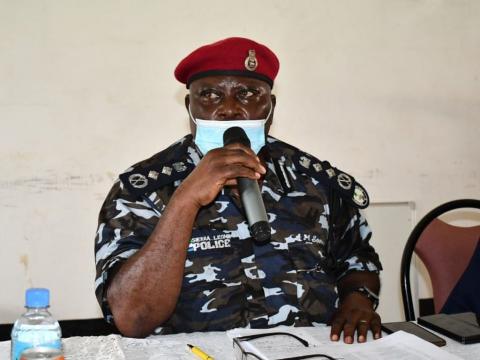By Mabinty M. Kamara
Police response to last year’s violent protests in Makeni, Tombo and Tonko Limba was violent, leading to the loss of life. This is according to a new report by the Bombali Human Rights Committee.
In a report titled “Study on Police Response to Protests”, the group recommends a review of the Sierra Leone Police (SLP) training structure, incorporating human rights at all levels of their training.
The 16-page report says such a review “[M]ust include human rights and democracy during their initial training and as refresher training for all levels and sectors. There is a need for the SLP to understand protests as a right of citizens within a democracy”.
The report covers a number of incidents that occurred over the past years that required the intervention of the Sierra Leone Police such as the violent protests in the fishing village of Tombo in the Western Area, during the local council by-election at Tonko Limba in the Kambia District, over the reallocation of the generator in Makeni in the Bombali District and the riot and jailbreak at the Pademba Road Correctional Centre in Freetown.
“Unfortunately, the response of the security forces (both the police and the military) to these riots allegedly resulted in the deaths of a number of citizens. The worrying trend has been the delays in establishing independent investigations, the report published for public consumption in a timely manner, and those found wanting to be penalized for their actions,” the report reads.
It adds that the families of the deceased are still yearning for justice to be meted out to those responsible for the deaths, for institutions to take responsibility for the lapses that resulted in the deaths of citizens, some of whom were not involved in the protest.
It says that with the violent response of the security forces, the underlying challenges that resulted in the protests are largely ignored, but which urgently requires attention by the relevant stakeholders.
The thrust of the investigations according to the group is to hold the duty bearers accountable and seek justice for rights holders.
However, the Inspector General of Police, Andrew Michael Sovula denies the allegations, noting that in all of the incidents the police managed to respond to the situations professionally despite the attacks from the “irate” protestors.
Speaking to Politico from Lebanon, he said thus: “The people do not want to take order and their response always to police interventions is marred [by] arms and ammunition. This has been proved in most cases and when challenges come in those situations, it is difficult for you to determine whether the police did not use a proportionate force. The Police equally are human beings just like the people, everyone has his own human rights and dignity”.
He added: “if you do not fire at the police, the police will not fire at you.” He said that they recently discovered about 10,000 shotguns in a vehicle about to be taken to Makeni.
The IG added that the police were not superhuman, so he urged the people to be law-abiding and also for the police to always ensure they use proportionate force in their responses.
Part of the recommendations of the report are for the police to employ a community policing approach, develop frequent training sessions on riot control, adopt an apolitical posture and protect all citizens, reconsider the use of lethal weapons to control riots/protests and replace them with rubber bullets, tear gas. They also include the abolition of the use of the military during citizens’ protests, the setting-up of an independent investigation on allegations of deaths by gunshot and for such a report to be published and the officers to be penalised if found wanting. They also call on the security sector to review the use of MAC-P (military aid to civil power), noting that the Police are better equipped and trained to engage in community dialogue than the military.
Copyright © 2021 Politico Online








